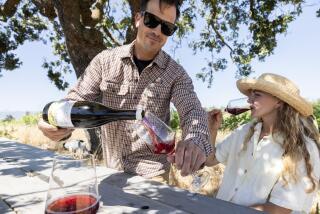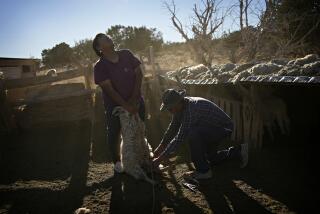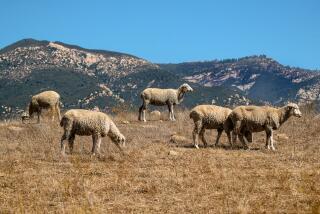Vintners’ Solution to Weeds: an Attack by Mild Animals
- Share via
LOMPOC, Calif. — Grape grower Steve Pepe has a new crew of weed whackers who lack Social Security numbers, couldn’t care less about health insurance and will never ask for a raise.
Henley, Matilda and Althea are Babydolls, miniature sheep that top off at 2 feet. What they lack in stature they make up for in promise. If they work out, Pepe will be able to avoid farm chemicals, slash weeding bills and improve his soil.
The sheep have voracious appetites for weeds, but they aren’t quite tall enough to reach fruit on trellised grape vines. Looking like muddy cotton balls as they forage on Pepe’s Santa Rita Hills farm, the sheep feel like a damp, dirty sweater.
Pepe watches Matilda and her co-workers mow away clump after clump of nettlesome weeds. They seem to digest them almost instantly, producing healthier vines with their natural fertilizers.
That means more flinty Chardonnays and Pinots Noirs with hints of cedar and black cherries for customers who are increasingly demanding organic wines.
Perhaps, Pepe muses, the sheep will be the secret ingredient that brings his prized Clos Pepe Pinot Noir, which retails for $40 a bottle, more gold medals. California has been known for revolutionizing the wine world with innovations such as harvesting grapes at night and using stainless steel tanks for fermentation. Vintners -- including Clos Pepe in Santa Barbara County, Puma Springs Vineyard in Sonoma County and Navarro Vineyards in Mendocino County -- are embracing the toy-size sheep.
In Mendocino County, University of California researchers are trying to train full-size sheep -- which can grow upward of 36 inches tall -- to give up eating grape leaves and become biological lawnmowers.
Researchers allow the sheep to chomp grape leaves in a small Hopland vineyard, then immediately feed the animals a dose of lithium chloride, which makes the sheep sick to their vinifera-filled stomachs.
“We are trying to create a powerful negative association with grape leaves,” said Morgan Doran, a livestock expert at the UC Cooperative Extension in Fairfield, Calif.
But some farmers say they don’t need research to tell them that Babydolls are the real deal: They don’t need to be conditioned to eschew grapes.
Sarah Bennett, whose family owns Navarro Vineyards, said she was surprised at how hard her leased flock worked, even eating the “suckers,” or green shoots that grow off the woody lower sections of the vines.
“Removing the suckers was something that we had to do by hand,” said Bennett, who is considering breeding her own flock.
There are other benefits. Miniature animals come with miniature hoofs, which are easier on the soil than tractors or even farmworkers’ boots. And unlike a John Deere, the sheep never get stuck in the mud and can reach into nooks and crannies.
Unlike goats, which tend to reach up when they forage, “these sheep tend to eat down toward the ground,” said Tony Crabb, who leased 12 sheep for $2 a day per head last year. He has plans to bring them back to his Puma Springs Vineyard in January.
Pepe, who paid $2,000 for his three animals, figures that by the time his ram and two ewes procreate into a flock of three dozen animals, he will not have to rely on human and mechanical weeders to clean his 40-acre farm, saving as much as $3,000 an acre in farming expenses.
Pepe bought his sheep from Deborah Walton, who breeds the animals at her Canvas Ranch near Petaluma, Calif.
Walton said the animals originated in Sussex County, England, hence their proper name: Olde English Miniature Babydoll Southdown Sheep. Babydolls are the oldest known purebred sheep in the world, she said.
With a flock of more than five dozen animals, Walton has turned the sheep into a thriving business, leasing to farmers or selling the animals outright.
“I have every sheep booked for the next year,” Walton said. “I could have three times as many sheep and still not be able to supply all the people who have contacted me.”
Walton won’t lease sheep to a vineyard that uses pesticides because she doesn’t want them to become toxic sheep. And her clients’ farms need to have fencing and guard dogs because predators relish lamb chops.
Walton leased 20 sheep to Fetzer Vineyards in 2004, but “two sheep were killed and then I had to take them all out,” Walton said. “Once the coyotes knew the sheep were there they kept coming back.”
At Clos Pepe, the sheep are protected by Rosa, a grimy black-and-white border collie that chases off coyotes and occasional bobcats that roam the coastal mountains.
Before the sheep arrived, “Rosa ran around trying to herd people, the other dogs and even cars. Now she doesn’t pay much attention to us,” Pepe said.
Pepe, who also produces olive oil, said the sheep might be useful for more than weeding. He believes it might be possible to produce Babydoll sheep cheese.
Pepe insists that he won’t turn Henley, Matilda, Althea and their offspring into chops “unless they start eating my grapes.”
But he acknowledges that it is tempting: Pinot Noir and lamb are a classic food pairing.







